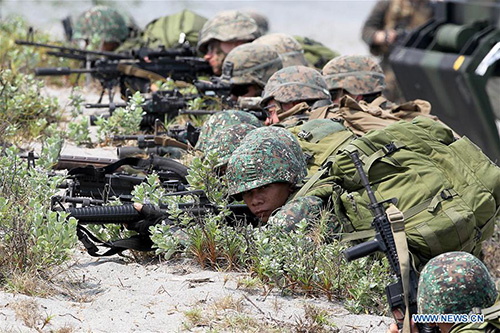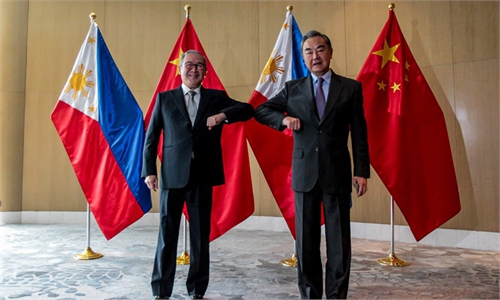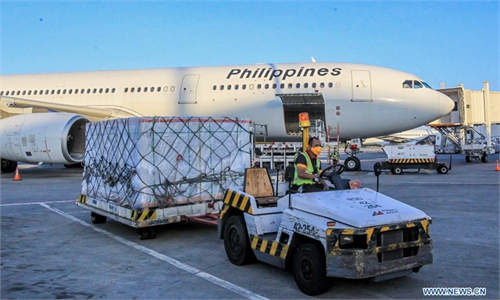
US and Filipino soldiers participate in the Amphibious Landing training as part of the 2018 Balikatan Exercises between the Philippines and the United States in Zambales Province, the Philippines, on May 9, 2018.(Xinhua/Rouelle Umali)
Soldiers from the Philippines and the US are scheduled to carry out two-week "Balikatan" (Shoulder-to-Shoulder) drills starting from Monday, the Philippine military chief said on Sunday.
When reporting on this event, some Western media outlets underlined the background of recent spats between China and the Philippines over the case that some Chinese fishing vessels take shelter near Niu'e Jiao, part of China's Nansha Islands, due to rough sea conditions. Military drills are common between the US and its allies. The "Balikatan" drills are one of their annual exercises, despite being canceled in 2020 due to the coronavirus pandemic.
However, it remains unclear whether their "Balikatan" drills this year are directed at the frictions over Chinese fishing boats.
Still, it is noteworthy that US Secretary of Defense Lloyd Austin held a phone call with his Philippine counterpart Delfin Lorenzana on Saturday. To deepen their defense cooperation, Austin proposed "enhancing situational awareness of threats in the South China Sea."
Prospects of military cooperation between the two countries will be dim. For one, most military assistance offered by Washington to Manila is highly restricted and symbolic. In February, the administration of President Rodrigo Duterte complained that the US is providing the Philippines with military aid that amounts to "loose change" in comparison to other Asian countries, according to Reuters.
For another reason, the scale and frequency of their joint war games have remarkably declined - especially since Duterte took office in 2016. For example, it is reported that in this year's "Balikatan" drills, about 700 US soldiers and up to 1,300 members of the Philippine military will take part - only about a quarter of the usual attendance.
In terms of Austin's desires for "enhancing situational awareness of threats in the South China Sea," this is clear: The US is attempting to escalate its involvement in South China Sea affairs.
Actually, Washington tends to exploit any friction between China and other claimants of the South China Sea to engage in the disputed waters. From the US' perspective, the China-Philippine recent spat is a good chance. It can try to use it to rope in the Philippines, driving a wedge between Beijing and Manila.
During the call, Austin also reiterated the importance of the Visiting Forces Agreement (VFA) between the two countries. Duterte had notified Washington in February 2020 to cancel the deal, but the VFA withdrawal period has already been extended twice. In February this year, Duterte said he did not yet make a decision regarding the future of the two-decades-old troop deployment agreement with the US.
The VFA provides a legal basis for US warships or relevant personnel to enter the Philippines. Without it, the US will face more obstacles boosting its military presence in the South China Sea. Therefore, Washington hopes to renew the agreement without any delays.
For the Duterte administration, the VFA is a bargaining chip seeking more assistance from the US. The US has been talking out loud, yet has done little in terms of providing military assistance to the Philippines. So Manila would rather keep the deal, rather than tearing it up, to gain more benefits. That being said, the future of the agreement depends on the struggling between the US and the Philippines.
As for the bilateral relations, the Philippines actually has an ambivalent attitude toward the US. The Philippines hopes to receive assistance from the US. Yet it has always remained vigilant toward the US' major power mind-set.
In the future, the relations between the two countries will continue with such complicated mentality.
Duterte will leave office in June 2022, with the general election scheduled in May 2022. All parties in the Philippines will take advantage of the relations with the US and conflicts with China to obtain political interests. There are also politicians who want US political support.
With elections approaching, the Philippines is also expected to be a hot topic of China-US relations. This will obviously affect both US-Philippines relations and China-Philippines relations.
The author is director of the Center for Southeast Asian Studies at the Chinese Academy of Social Sciences in Beijing. opinion@globaltimes.com.cn



